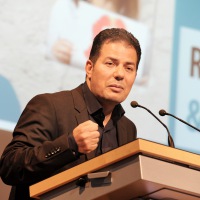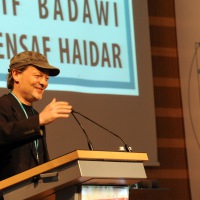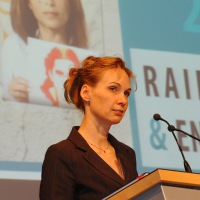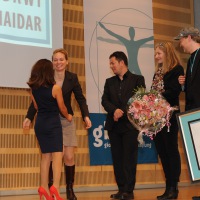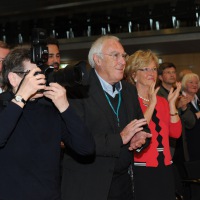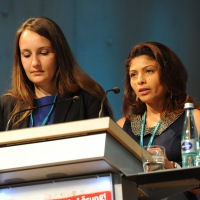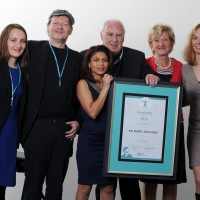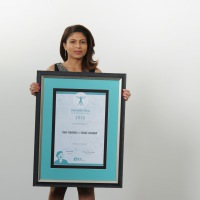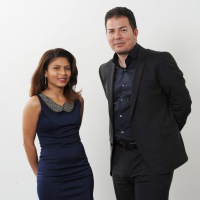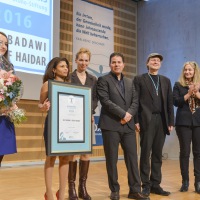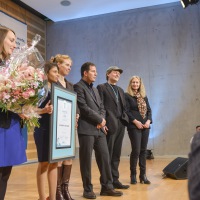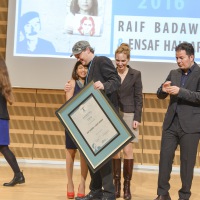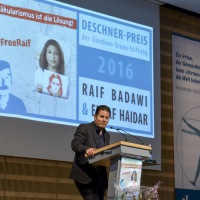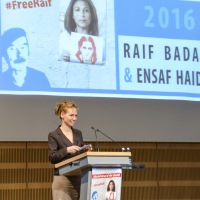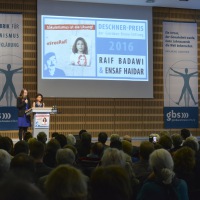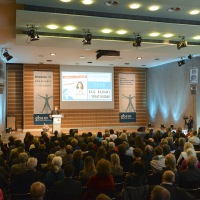The Courage to Walk Upright
Raif Badawi and Ensaf Haidar have been awarded the Deschner Prize of the Giordano Bruno Stiftung in Frankfurt
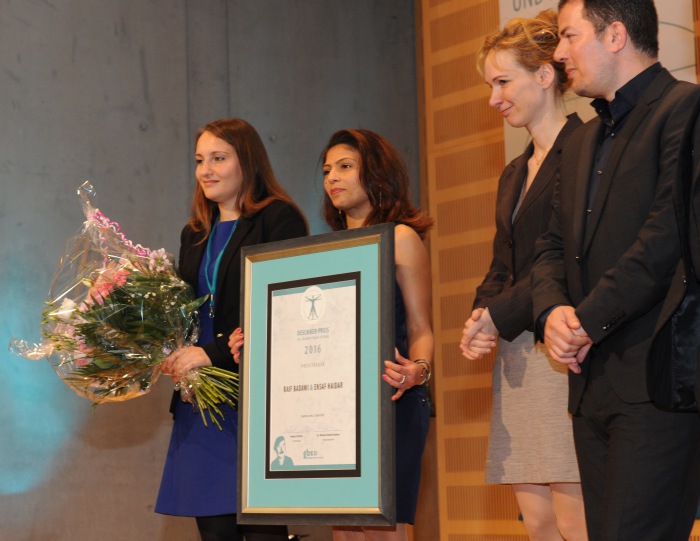
haidar_deschnerpreis1.jpg
Photo: Jörg Salomon
The blogger Raif Badawi, sentenced to 10 years imprisonment in Saudi Arabia and 1,000 blows with a stick, and his wife, human rights activist Ensaf Haidar, were awarded the Deschner Prize of the Giordano Bruno Stiftung (gbs) last Saturday in a moving ceremony at the German National Library in Frankfurt. Badawi and Haidar received the prize worth 10,000 euro for their "mutual, courageous and self-sacrificing commitment to secularism, liberalism and human rights".
In his opening statement, gbs spokesman Michael Schmidt-Salomon stated that the ceremony is a "protest against the barbaric injustice" that Badawi had experienced in Saudi Arabia, but also a "celebration of the free spirit that cannot be suppressed entirely even under the most cruel and dictatorial conditions". According to Schmidt-Salomon, Raif Badawi and Ensaf Haidar impressively demonstrated the "courage to walk upright" and thus become "role models for men and women worldwide who no longer want to resign themselves to totalitarian politics, religious paternalism, and patriarchal role models".
The gbs spokesman fiercely criticised the German government for rejecting any sanctions against Saudi Arabia in January 2016. Schmidt-Salomon, quoted: "In the field of human rights, the national government does not show any political profile, but pursues a spineless appeasement policy against despots, by which the values of freedom and equal rights of all people cannot be defended!
gbs video for the ceremony
The author and Middle East expert Andrea C. Hoffmann, who in collaboration with Ensaf Haidar wrote her autobiography "Freiheit für Raif Badawi, die Liebe meines Lebens" ("Freedom for Raif Badawi, the love of my life"), pointed out in her contribution that without Ensaf Haidar nobody would know about Raif Badawi's fate today. The fact that Raif is still alive is largely thanks to Ensaf, who does not at all correspond to the stereotype of a shy and withdrawn Saudi Arabian woman. Hoffmann was therefore very pleased that the Deschner Prize was awarded to both Raif Badawi and Ensaf Haidar: "We all have recognised by now what a strong woman stands behind this impressive man".
Hamed-Abdel-Samad, who gave the laudatory speech for the prize recipients, also emphasised this. Visibly moved, Abdel-Samad, who has been under personal protection for months, described how important Raif Badawi and Ensaf Haidar are for the secular movement in the Arab countries. Through Ensaf Haidar's commitment, the fate of her husband became known to the world public - unlike the fates of many other political prisoners. Badawi and Haidar became symbolic figures of resistance against political Islam, not least because of their ethical and political persistence. Thus, Raif Badawi did not follow the proposal of an "distinguished European politician", who had suggested him to "apologise" for his fight for freedom and human rights in order to increase the chance to be released earlier.
Hamed Abdel Samad explained that his concern was not the "Islamisation of Europe", but the "spineless opportunism of European politics", which did not speak up resolutely enough for the values of an open society. In this regard, Europe should learn from Raif Badawi and Ensaf Haidar, from their courage and determination. Abdel-Samad, who as an adviser to the Giordano Bruno Stiftung had proposed awarding the Deschner Prize to Raif Badawi and Ensaf Haidar, also said, as did Schmidt-Salomon, that if the country continued to commit serious human rights violations, Germany absolutely has to increase pressure on Saudi Arabia.
Ensaf Haidar, who was celebrated with standing ovations at the award ceremony by approximately 300 participants, emphasised in her acceptance speech how important international awards such as the Deschner Prize are for Raif, as they show that he and the many other political prisoners are not alone and that their commitment to human rights is valued internationally. She was overwhelmed by the ceremony in the National Library and thanked her countless supporters worldwide, especially in Germany, where the commitment to Raif and the other political prisoners is particularly high.
An excellent example for this is the Frankfurt Amnesty International group, which was present at the ceremony in the German National Library with its own booth and has been protesting every Thursday since January 2015 in front of the Saudi Arabian consulate in Frankfurt against the arrest of Raif Badawi. Following the ceremony, which had to take place under strictest security measures, gbs spokesman Michael Schmidt-Salomon announced that the Giordano Bruno Stiftung will of course continue to work for the release of Raif and the other political prisoners in Islamic countries. For this purpose, a closer cooperation between the gbs and the Raif Badawi Foundation, founded by Ensaf Haidar, is planned.
Picture gallery 1 (photos by Evelin Frerk)
Picture gallery 2 (photos by Jörg Salomon)
Documentation of the opening speech by Michael Schmidt-Salomon
The Courage to Walk Upright
Why the Giordano Bruno Stiftung awards the Deschner Prize to Raif Badawi and Ensaf Haidar
Ladies and Gentlemen,
It is a great honour and pleasure for me to welcome you to this ceremony at which Raif Badawi and Ensaf Haidar will be awarded the Deschner Prize of the Giordano Bruno Stiftung. As you may have noticed at the entrance, we had to take special security measures for this event. And perhaps some of you arrived in Frankfurt with a slightly uneasy feeling.
I think everyone who works in the field of religious criticism, especially Islam criticism, knows this feeling. I personally felt it particularly strongly 9 years ago when we introduced the Central Council of Ex-Muslims with its campaign "Wir haben abschworen!" in the House of the Federal Press Conference. It was the first time that former Muslims confessed so offensively to apostasy - as you know: a death-worthy offence from a radical Islamic point of view.
The security precautions taken at this press conference were correspondingly stringent. And I still remember, with a slight shiver, the tense atmosphere that prevailed in the hall when I introduced the two current chairwomen of the Central Council of Ex-Muslims, two very courageous women, Mina Ahadi and Arzu Toker, who are also among our guests today, about which we are particularly pleased.
I am sure that if there had been a thunderstorm outside at this press conference on 28 February 2007, many of the people present would have thrown themselves to the ground at the first thunderclap in fear of a terrorist act. Rarely before and rarely afterwards did I realise how fragile this delicate plant of "freedom" is, which we usually take for granted.
If the intimidation attempts of militant Islamists produces such effects even here, in a secular country like Germany, how much more oppressive, how much more dramatic must the situation be for freedom-loving people living in the centres of this terror? How much must it take to overcome yourself to resist there? How much courage must be shown to demand respect for human rights in a country where disregard for human rights has become a dogma?
Raif Badawi mustered this courage - and he had to pay dearly for it. His demand for equal treatment of all people, regardless of religion and belief, origin, and gender, was classified as an "insult to Islam" and punished with 10 years imprisonment and 1000 blows with a stick. This ceremony is primarily a protest against the barbaric injustice expressed in this judgment, but it is much more than that. We also see this ceremony as a celebration of the free spirit, which does not allow itself to be completely suppressed even under the most cruel, dictatorial circumstances.
This is exactly what Raif Badawi and Ensaf Haidar have shown. With this ceremony, we want to celebrate their impressive demonstration of their ability to walk upright - and that is why we are very honoured that Ensaf made the journey from Canada to receive the Deschner Prize tonight at the German National Library. Hello and welcome, Ensaf Haidar!
The Giordano Bruno Stiftung awards the Deschner Prize for criticism of religion and ideology, endowed with 10,000 euros, to Raif Badawi and Ensaf Haidar for their joint, courageous, and self-sacrificing commitment to secularism, liberalism, and human rights, which has significance far beyond Saudi Arabia. Raif and Ensaf became role models for men and women worldwide who no longer want to accept totalitarian politics, religious paternalism, and patriarchal role models. Thus, they not only had an effect on the Muslim world, but also led the delusions of Western right-wing populists ad absurdum, who can only see followers of jihad in "the" Muslims, "the" refugees.
When the images of Raif's public lashing appeared on the internet, an outcry of indignation went around the world. The massive reaction of global civil society put Saudi Arabia under so much pressure that the corporal punishment was suspended. At the height of the protests, at the end of January 2015, the pressure was so strong that the Saudi ambassador in Berlin felt compelled to promise Badawi's early release.
Obviously Saudi Arabia was still expecting serious foreign policy consequences at that time. However, there have been no real consequences or even threats of such consequences - a fatal error on the part of international policy, especially German policy. Instead of taking a clear stand, leading politicians fell back into the old course of cordial diplomacy and entered into billion-dollar deals with a country that for years has been a major supporter of Sunni Wahhabi terror. The devastating human rights violations that Saudi Arabia commits day after day were mentioned - if at all - only in subordinate clauses, which the other side could easily ignore.
Things could have been different. As early as January 2015, the Green and Left parliamentary groups in the Bundestag submitted proposals aimed at increasing pressure on Saudi Arabia. The proposed sanctions were well-founded and would have undoubtedly found support among the population. But with the votes of CDU/CSU and SPD, the motions were first rejected in all relevant Bundestag committees and finally, at the beginning of this year, also in parliament.
This scandalous process has hardly been mentioned in the media. The rejection of all sanctions against Saudi Arabia by the Bundestag in January 2016 provided far more proof of spinelessness in German politics than the widely discussed Merkel-Erdogan-Böhmermann affair. In the field of human rights, the Federal Government does not display any distinct positions, but pursues a spineless appeasement policy towards despots, with which the values of freedom and equal rights of all people cannot be defended and against which we must protest resolutely!
Ladies and gentlemen, the behaviour of the Saudi ambassador in January 2015 has shown that Saudi Arabia is indeed responding to external pressure. Therefore, it is up to politics to intensify this pressure by threatening sanctions that actually hurt the regime or that provide the more progressive forces within the regime with an additional argument to assert themselves against the guardians of the status quo. Constantin Schreiber, who published Raif Badawi's texts in German, pointed out at the beginning of 2016 what Germany could - in fact must do if Saudi Arabia does not comply in the field of human rights in general and in the case of Badawi in particular:
- Immediate stop of all arms exports
- Entry restrictions for Saudis, in particular for the Saudi royal family with over 10,000 members
- Consistent renunciation of Saudi oil
- Termination of economic cooperation with Saudi Arabia, which is particularly dependent on German technology.
In addition, it would be necessary to finally implement what the Left faction had already demanded in January 2015: the Federal Government should not only support the immediate release of Raif Badawi, but should also offer him asylum and instruct the German Ambassador to Saudi Arabia without delay to visit Raif regularly in prison. The latter would only be a small step for Germany, but would be of great importance for Raif.
If German politics were actually to pursue such an agenda, it could represent the values of humanism and enlightenment, which form the basis of the modern constitutional state, much more credibly in the world. And in this way it could also advertise much more credibly that "secularism" is indeed "the solution", as Raif wrote in his letter from prison. For this much is certain: without secular social norms, without separation of state and religion, there will be no peace, freedom, and social justice in any country of the world.
It is a remarkable phenomenon that the term "secularism" appears predominantly among intellectuals from the Muslim cultural area, while here in the West we usually use the passive form "secularisation". The replacement of religious interpretations and ruling patterns by secular agreements within the framework of a free civil society - from a European perspective this appears to be a process that somehow takes place on its own, without requiring a great deal of commitment. This, however, is a fallacy, as can be seen not least from the fact that a frightening number of migrant families have not actually made their way into this society, even after several generations, which provides the breeding ground for so many young men and women to fall for the crude messages of Salafist hate preachers.
If you take a closer look, you quickly realize that secularisation is anything but a passive process that just happens. Secularisation demands corresponding actors, demands secularists who reject the absolute morals of religious dogmatists and propagate the idea of the social contract, in which the norms of coexistence are not preset by religion but are freely negotiated among the members of society.
Raif Badawi and Ensaf Haidar had the courage to stand up for the open society under the most difficult conditions imaginable. In this way, they have given voice and face to the strong but still underground secularist movement in Muslim countries. This alone has changed the world. I can't imagine any better recipients of the Deschner Prize. Thank you for your attention.


